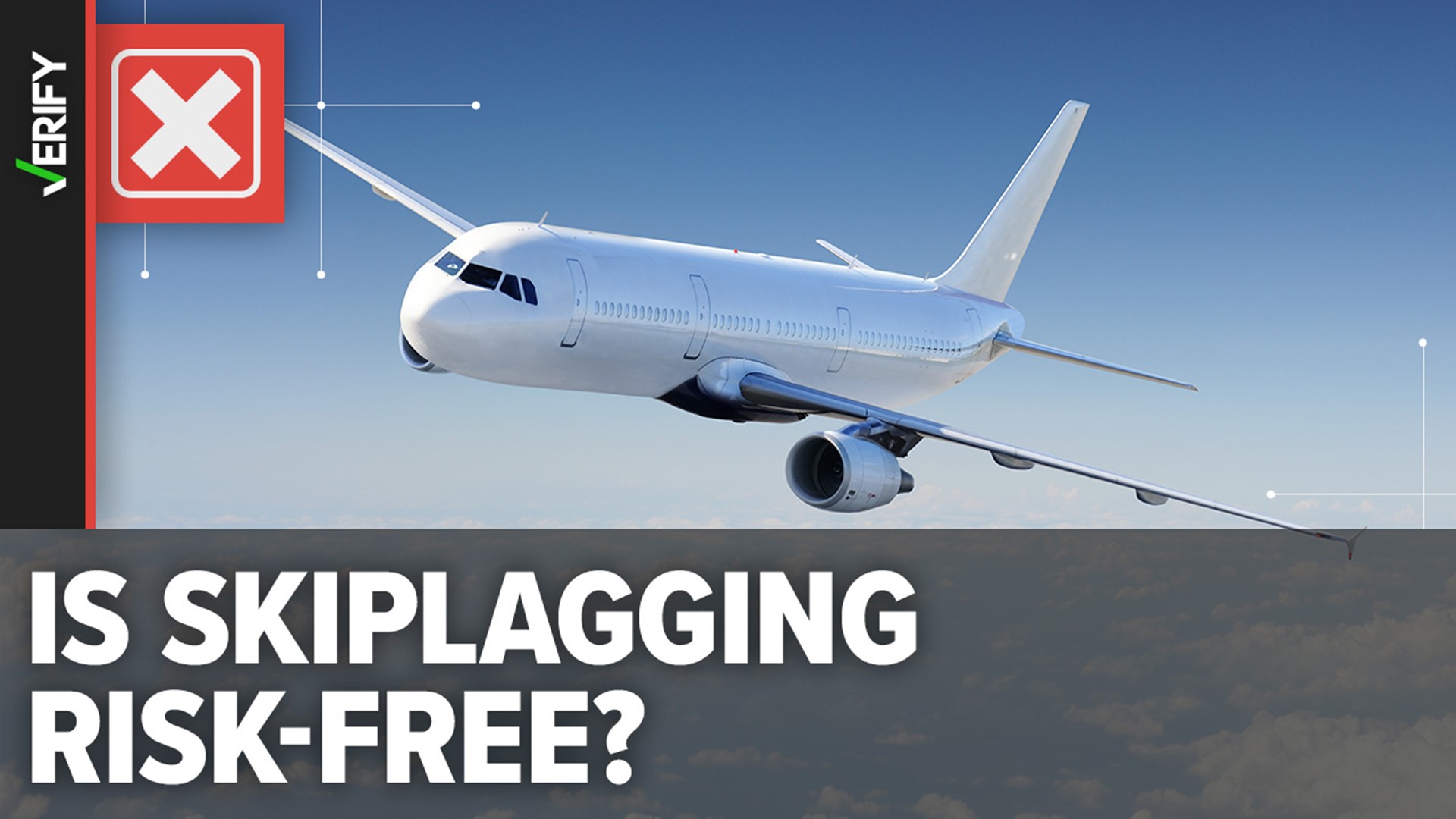Travelers are frequently looking for ways to save money on expensive airfare. One “hack” to save money has become popular on social media: skiplagging. The term refers to the practice of buying a plane ticket with a connecting flight and getting off at the connection rather than continuing all the way to the ticket’s final destination.
TikTok videos with the hashtag #skiplagging have been viewed more than 17 million times on the platform. One such video, viewed more than 6 million times, shows a traveler who bought a $127 ticket from Cleveland to Minneapolis with a layover in Dallas, instead of paying for a $465 flight directly to Dallas. The person who posted the video called the tactic a “cheat code.”
THE QUESTION
Is skiplagging a risk-free way to save money on air travel?
THE SOURCES
THE ANSWER
No, skiplagging is not a risk-free way to save money on air travel.
WHAT WE FOUND
Skiplagging, also called hidden-city ticketing, is when you buy a plane ticket with a layover with the intention of stopping at the layover city and not continuing on to the ticket’s final destination. It’s not illegal, but airlines can punish you for skiplagging if they catch you.
The practice is prohibited in the contracts of carriage of all but one of the 10 major airlines in the United States. The only exception is Allegiant Air, but they don’t sell any tickets with connecting flights.
Delta, American, United, Southwest, Alaska, and Frontier single out “hidden-city ticketing” as a prohibited ticketing practice. JetBlue, Hawaiian and Spirit don’t use the term “hidden-city ticketing,” but require passengers to complete the route on their ticket.
Each airline can cancel your ticket and refuse to board you if they catch you skiplagging, according to their contracts of carriage. While the potential punishments vary between airlines, they could also include charging you the difference in fare for the correct ticket, canceling travel miles, charging additional fees for the costs of delivering your baggage and confiscating your unused travel coupons.
United’s carriage contract goes as far as to say the airline can permanently ban you from its flights if it catches you.
The likelihood of you facing consequences for skiplagging can vary depending on your flight habits, says Katy Nastro, a travel expert with travel website going.com, formerly Scott’s Cheap Flights.
“By no means as a travel expert am I suggesting it, but at the same time, it's not illegal,” Nastro said. “And you know, if you don't abuse the practice, in theory it can actually help you.”
Skiplagging could be particularly risky for people who fly multiple times a year with the same airline, Nastro said. And if you’re not traveling light, skiplagging is out of the question.
“If you check a bag, that bag gets ticketed to your final destination, not to your connecting destination where you're able to get it and then go on your way,” Nastro said. “Trying to explain to the airline why your bag ended up in a different location than you is a little bit tricky.”
Nastro also said skiplagging is only feasible for one-way tickets. The contracts of carriage for many airlines say the airline will cancel the rest of your itinerary if you miss any leg of your trip.
Earlier this year, Queen City News, a news outlet in Charlotte, North Carolina, reported that one passenger who claimed he didn’t realize that skiplagging was in violation of airline policy was detained at the airport. The passenger had to buy a new ticket to get to their destination and was banned from flying with American Airlines for three years.
A website that sells airline tickets for the purpose of skiplagging, skiplagged.com, was sued by United in 2015 and American in 2023. American wrote in their complaint that all American Airlines tickets sold by skiplagged.com “are at risk for immediate invalidation” because the website does not have the authority to sell American tickets.
This story is also available in Spanish / Lee este artículo también en español: El skiplagging no es una forma libre de riesgos para ahorrar en pasajes aéreos

